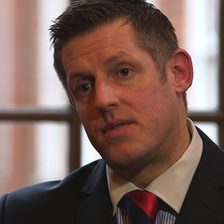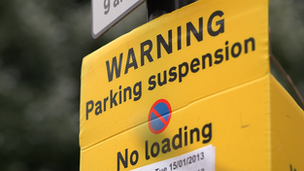£23m of parking fines 'may have been unlawful'
- Published
Parking bays are typically suspended to allow builders to carry out work
Almost 350,000 parking fines - totalling an estimated £23m - may have been unlawfully issued to motorists in London, a BBC investigation has found.
In 2010 a ticket issued in a suspended parking bay was ruled unlawful because Camden Council did not have authorisation for its signage.
Now the BBC has learned 16 councils still have no authorisation for these signs, while others went years without.
Some boroughs insist a later judgement made tickets enforceable.
A typical inner London council suspends more than 1,500 parking bays a month, often so building works can take place.
The Department for Transport (DfT) designs road signs for most situations, which authorities must follow closely.
But it has never produced a template for a suspended parking bay sign.
If no sign is set out by the DfT, the law says councils must ask the transport secretary to authorise their own creations.
Otherwise they would be effectively licensed to invent road signs at will.
In January 2010, motorist Suzanne Campbell defeated Camden Council at a Parking and Traffic Appeals Service (Patas) hearing after being ticketed in a suspended parking bay.
Adjudicator Edward Houghton ruled: "In the absence of a compliant sign the vehicle was not in contravention and the appeal must be allowed.
"No doubt the council will give consideration to obtaining the secretary of state's authorisation."
Shortly afterwards there was a rush of applications for authorisation from London councils. Some 14 received it by 2012.
But all these councils had been issuing tickets in suspended parking bays for years previously.
And the DfT told the BBC's Inside Out programme that another 16 councils still have no authorisation.
Neil Davies, a motoring solicitor at Caddick Davies, said: "From a legal perspective councils are on very shaky ground, because the signage they used is effectively made up.
'Ignore the laws'
"It's difficult to explain the actions of councils who haven't sought authorisation - they may be relying on the fact many people don't challenge parking notices."
Richard Bentley, an ex-police officer and signing consultant, said: "Each council is fully aware they have to apply to the secretary of state if they want to use signing that isn't set out within the regulations.
"It is astounding authorities ignore the very laws there to help them."
The BBC sent Freedom of Information requests to all 28 councils which had no authorisation prior to 2012 to find out how many potentially-unlawful tickets were issued.
Some councils provided a decade's statistics, others just two years.

Neil Davies contradicts London Councils' claim that the fines were lawful
But the BBC has traced a minimum of 343,956 tickets issued under unauthorised signs. The real number is probably far higher.
According to a Westminster City Council report, London boroughs make £67 per parking ticket - a total revenue more than £23m.
Mr Davies warned motorists fined years ago might find it hard to claw money back - as there is a time limit of 28 days to make an appeal.
But he said both councils and Patas could use their discretion to hear historic appeals.
He added: "There's certainly a strong moral argument for councils to refund those monies."
Local Transport Minister Norman Baker said: "The department provides clear guidelines to councils to help them produce signs that comply with regulations.
"These are there to protect motorists.
"It's not for government to police signs - this role falls to local politicians who are accountable to their residents."
The BBC's Inside Out programme contacted all 28 councils. None was able to provide an authorisation predating 2010.
However several authorities claimed a subsequent test case, a 2011 Court of Appeal judgement, meant their signage was nonetheless lawful.
That case established the legal principle that trivial failures to adhere to signage laws are not grounds to cancel a ticket if the sign is clear.
A London Councils spokeswoman said: "The Campbell case pre-dates an important decision in the Court of Appeal last year, where the court ruled a technical failure to comply with Traffic Signs Regulations does not invalidate signage so long as signs are clear and motorists are not misled.

A typical London borough suspends 1,500 bays a month or more
"This ruling has effectively prevented further successful appeals on the grounds of a technical failure to comply with the regulations where no harm can be shown."
But Mr Davies said inventing a sign without authorisation amounts to more than a "trivial" or "technical" failure to follow the law.
He pointed out that 12 councils sought authorisation even after the 2011 judgement, suggesting they knew it was still required.
Mr Davies added: "Parliament makes rules for a reason - to protect the public.
"For local authorities to ignore such rules is to deny the public protection."
Find out more on BBC Inside Out, on BBC One in the London region on Monday, 11 February at 19:30 GMT and nationwide on the iPlayer for seven days following transmission.
- Published28 January 2013
- Published9 January 2013
- Published22 January 2013